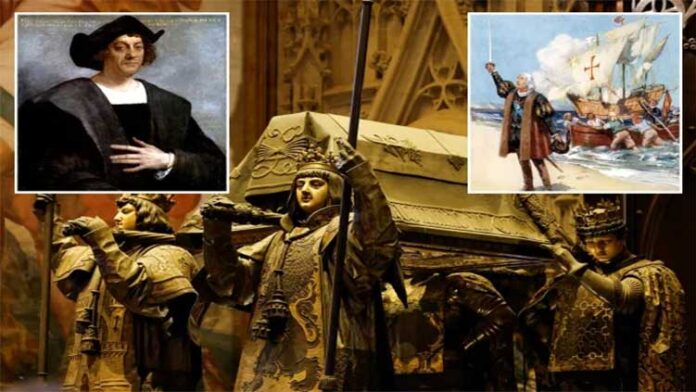Through DNA evidence, team were able to narrow down his place of birth to eight areas in Spain
(Web Desk) – Christopher Columbus, the renowned explorer credited with reaching the Americas in 1492 under the Spanish flag, is at the center of a groundbreaking study that aims to shed light on his origins through DNA evidence. Recent advancements in genetic research have enabled scientists to probe deeper into the life and ancestry of this historic figure, revealing intriguing details about his background.
In 2003, samples of Columbus’s DNA were collected from his remains, which were exhumed from the Seville Cathedral, believed to be his final resting place. Alongside his DNA, samples were also taken from the remains of his son, Hernando, and his brother, Diego. This endeavor marks a significant step in a long-standing quest to uncover the mysteries surrounding Columbus’s lineage and heritage.
For over two decades, researchers have meticulously analyzed these samples to piece together the puzzle of Columbus’s identity. A key point of contention has been the legitimacy of the remains located in Seville. Historical disputes have raised questions about whether these are indeed Columbus’s remains, or if they lie in the Dominican Republic, where a mausoleum dedicated to the explorer exists.
The findings from this extensive research were unveiled in a “documentary thriller” produced by Spain’s national broadcaster RTVE, which aired on October 12, coinciding with a national holiday that commemorates Columbus’s arrival in America.
Professor José Antonio Lorente, a forensic medicine expert at Granada University, played a pivotal role in the extraction and analysis of the DNA samples. He stated, “We have been able to prove beyond all doubt, with new technology, the previously unconfirmed theory that the remains in Seville are indeed those of Christopher Columbus.” However, the team acknowledged the possibility that some of his remains might also be located in the Dominican Republic, keeping the debate alive.
Another long-standing question regarding Columbus has been his birthplace. While it has been widely accepted that he was born in the Italian city of Genoa, there have been numerous claims—over 25 different locations have laid claim to his origins. The latest DNA analysis, however, has narrowed down his birthplace to eight potential regions in Spain, Portugal, and Italy, including the Spanish island of Mallorca and the Galicia region in Spain. This finding suggests that Columbus was likely from Western Europe, although the precise location remains undetermined.
In addition to geographical revelations, the DNA testing has uncovered an astonishing aspect of Columbus’s heritage—he is believed to have been of Sephardic Jewish descent. Professor Lorente elaborated, “We have DNA from Christopher Columbus, albeit partial, but sufficient to draw conclusions. We also have DNA from his son, Fernando Colon. Both the Y chromosome (inherited from the father) and the mitochondrial DNA (passed down through the mother) of Fernando exhibit traits that are compatible with Jewish ancestry.”
This discovery adds a new layer to our understanding of Columbus, potentially reshaping historical narratives surrounding his identity. The implications of his Jewish roots are profound, especially considering the historical context of the time. The 15th century was marked by the expulsion of Jews from Spain, and understanding Columbus’s heritage could offer insights into his motivations and interactions during his voyages.
As the research continues, the findings will likely spark further discussions among historians, geneticists, and the public alike. The intersections of history, culture, and science come together in this captivating investigation, providing an opportunity to reevaluate the legacy of one of history’s most famous explorers.
This exploration of Columbus’s DNA not only aims to clarify his lineage but also highlights the broader significance of genetic research in uncovering historical truths. As science continues to evolve, it offers powerful tools for examining our past, encouraging a reexamination of well-established narratives and inviting new perspectives on figures who have shaped our world.
The revelations about Columbus’s origins will undoubtedly contribute to ongoing discussions about identity, heritage, and history, reminding us that the past is often more complex and nuanced than it initially appears. As we await further developments from this pioneering research, it is clear that the story of Christopher Columbus is far from over, with new chapters ready to be written.


